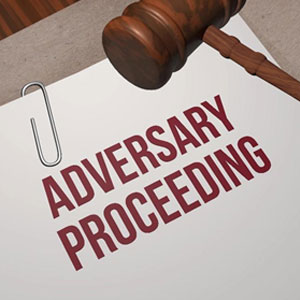 In this article, you can discover:
In this article, you can discover:
- What adversary proceedings in bankruptcy entail and the various types of such cases.
- Who can file an adversary proceeding in bankruptcy and why they might do so.
- How to defend against an adversary proceeding and the potential outcomes.
What Are Different Types Of Adversary Cases In Bankruptcy?
Adversary cases in bankruptcy come in various forms, with the most frequent being either a creditor filing a case under Code Section 523 to request that a specific debt be declared non-dischargeable, or the debtor filing an adversary proceeding against a creditor to assert that the debt is dischargeable or to determine the collectability of the debt through bankruptcy.
How Do Adversary Proceedings Differ From Regular Bankruptcy Cases?
Regular bankruptcy cases are more transactional, involving a step-by-step process in which a petition is filed, claims are made, and the Bankruptcy Code outlines how these claims are to be paid handled.
On the other hand, adversary proceedings are akin to a separate litigation matter within the bankruptcy case. They involve a plaintiff and a defendant, one of whom is always the debtor, contesting a specific issue. This differs from the bankruptcy process, which focuses on assembling the debtor’s debts, obligations, and assets, and subsequently discharging or repaying certain debts.
What Are Common Reasons For Filing An Adversary Proceeding In Bankruptcy?
The most common reason for filing an adversary proceeding is when a creditor attempts to determine a debt as non-dischargeable under Code Section 523. The creditor argues that, due to the debtor’s actions, the specific debt should not be discharged in bankruptcy. While other adversary proceedings might be filed by the debtor or trustee, the majority are filed by creditors seeking non-dischargeability.
Who Can File An Adversary Proceeding In Bankruptcy?
An adversary proceeding can be initiated by the debtor, a creditor, or the trustee. In essence, only those with an interest or claim against the debtor’s estate assets can file such a proceeding.
What Is The Statute Of Limitation For Filing An Adversary Proceeding In Bankruptcy?
The deadline for filing an adversary proceeding is usually established in the court’s initial order following the filing of the case. This deadline is typically short, based on the timing of the petition filing or the completion and closing of the meeting of creditors under bankruptcy code section 341.
How Long Does An Adversary Proceeding Usually Take?
An adversary proceeding, which could be described as a “mini-litigation,” generally takes less time than standard litigation in state or federal court. The typical duration of an adversary proceeding ranges from about three to six months from filing to resolution. However, this timeline may be extended if the involved parties agree to do so, such as to negotiate a settlement or resolution.
What Are The Potential Outcomes Of An Adversary Proceeding?
The potential outcomes of an adversary proceeding largely depend on the type of case filed. Generally, the court might determine a debt as either non-dischargeable or dischargeable in the debtor’s bankruptcy. Alternatively, if the trustee files an action, the court may decide whether the asset the trustee seeks is part of the estate or not.
How Can A Debtor Defend Against An Adversary Proceeding In Bankruptcy?
To defend against an adversary proceeding, a debtor will need legal representation. This could be their bankruptcy attorney or separate counsel. The attorney will file an answer or motions to dismiss on behalf of the debtor and will aid the debtor in resolving or litigating the matter as necessary.
What Happens If A Debtor Loses An Adversary Proceeding In Bankruptcy?
The consequences of losing an adversary proceeding depend on the type of case at hand. If it’s a typical non-dischargeability of debt case and the court determines the debt as non-dischargeable, then that debt will not be discharged in the debtor’s bankruptcy. The debtor will then be obliged to pay the debt to the creditor or reach some resolution with them.
For more information on Different Types Of Adversary Proceedings, an initial consultation is your next best step. Get the information and legal answers you are seeking by calling (205) 506-3354 today.

Call Us Now For A Personalized Case Evaluation
(205) 506-3354

